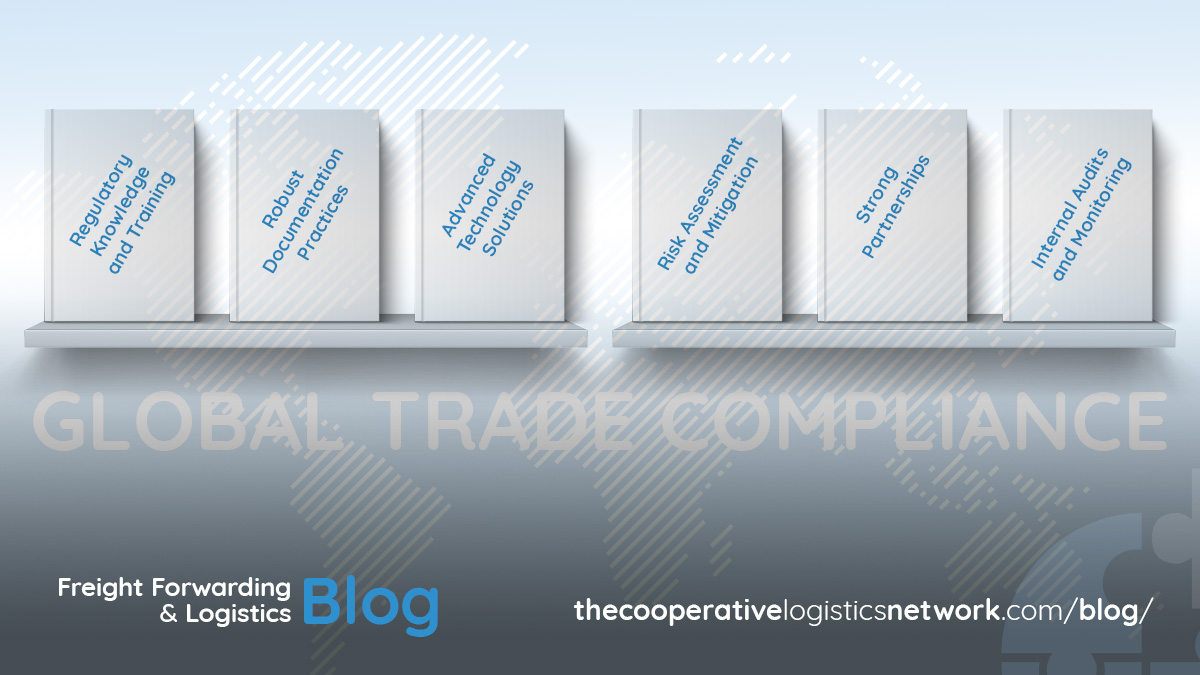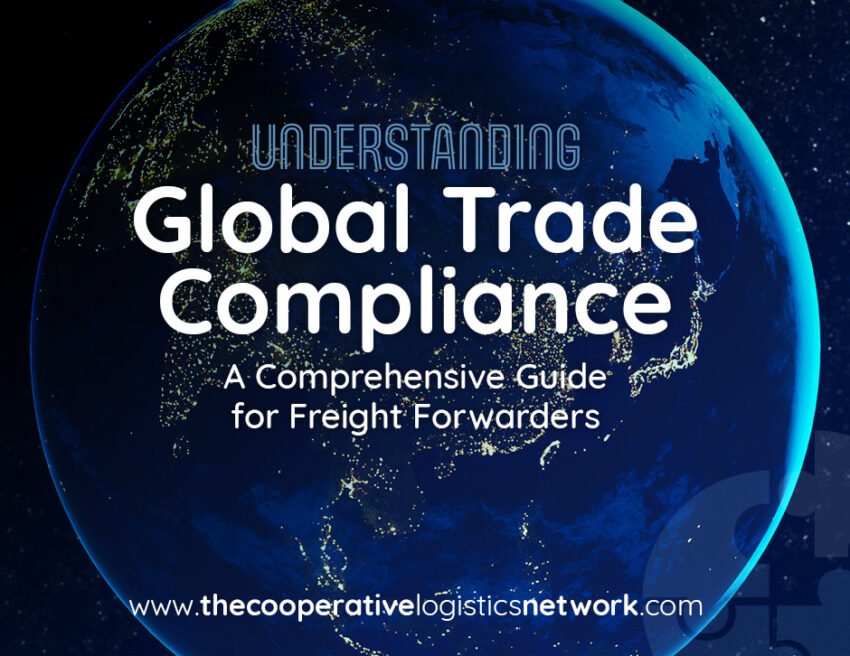In today’s interconnected world, global trade is the backbone of the economy, enabling businesses to expand their reach and consumers to access products from around the globe. However, with this opportunity comes complexity, particularly when it comes to compliance. For freight forwarders, who play a critical role in facilitating international trade, understanding and adhering to global trade compliance requirements is not just a legal obligation but a competitive advantage. This blog delves into the intricacies of global trade compliance for freight forwarders, offering insights, strategies, and best practices to navigate this challenging landscape.

Understanding Global Trade Compliance
Trade compliance refers to adhering to the laws, regulations, and policies that govern international trade. These rules are designed to ensure national security, prevent illegal trade, regulate tariffs and duties, and protect consumers.
For international freight forwarders, trade compliance means ensuring that all shipments meet the required legal standards of both the origin and destination countries. This includes proper classification of goods, adherence to customs regulations, and compliance with trade agreements and sanctions.
Several international organizations and agreements shape global trade regulations. The World Trade Organization (WTO) establishes trade rules and dispute resolution mechanisms, while the International Chamber of Commerce (ICC) provides trade facilitation guidelines, including Incoterms. The World Customs Organization (WCO) sets international customs standards and promotes global trade security. Additionally, regional trade agreements such as the USMCA, the European Union’s customs regulations, and ASEAN trade agreements impact how goods are moved across borders. Sanctions and embargoes enforced by entities like the U.S. Office of Foreign Assets Control (OFAC) and the United Nations (UN) also influence trade policies.
Each country has its own customs and trade laws, making it imperative for freight forwarders to stay updated with regulatory changes to ensure compliance.
The Role of Freight Forwarders in Global Trade Compliance
Freight forwarders act as intermediaries between shippers and carriers, coordinating the movement of goods across international borders. Their responsibilities extend beyond logistics to include ensuring that shipments comply with the regulatory requirements of both the origin and destination countries. This involves:
- Accurate Documentation: Preparing and verifying essential documents such as commercial invoices, packing lists, bills of lading, and certificates of origin.
- Customs Clearance: Ensuring that shipments meet customs regulations, including proper classification, valuation, and duty payment.
- Risk Management: Identifying and mitigating risks related to sanctions, embargoes, and restricted goods.
- Trade Program Utilization: Leveraging trade agreements and programs to reduce tariffs and streamline cross-border transactions.
Given their pivotal role, freight forwarders must stay informed about evolving regulations and invest in compliance-focused processes and technologies.
The Challenges of Global Trade Compliance
One of the biggest challenges in global trade compliance is the complexity and constant evolution of regulations. International trade laws frequently change due to geopolitical shifts, economic policies, and global security concerns. Keeping up with these changes can be overwhelming for businesses, especially those operating in multiple markets.
Another significant challenge is tariff classification and valuation. The Harmonized System (HS) code is used globally to classify goods for taxation and trade statistics. Misclassification can lead to overpayment of duties, penalties, or shipment delays. Determining the customs value of goods is also essential, as incorrect valuation can result in disputes with customs authorities.
Customs documentation and procedures add another layer of complexity. Incomplete or incorrect documentation is one of the primary reasons for shipment delays and fines. Essential trade documents include commercial invoices, bills of lading, packing lists, certificates of origin, import/export permits, and customs declarations. Ensuring that all documentation is accurate and compliant with regulations is crucial for a seamless shipping process.
Freight forwarders must also navigate the complexities of sanctions and export controls. Many countries impose restrictions on trade with certain nations, individuals, or organizations. Engaging in trade with sanctioned entities can result in severe penalties and reputational damage.
With increasing digitization in global trade, data security has become a critical compliance issue. Cyberattacks targeting shipping and logistics companies have surged, putting sensitive trade data at risk. Freight forwarders must invest in cybersecurity measures to protect their systems and ensure the integrity of trade transactions.
Essential Components of a Global Trade Compliance Program
To overcome these challenges, freight forwarders must implement a comprehensive compliance program that addresses the following key components:
1. Regulatory Knowledge and Training
Staying updated on global trade regulations is the foundation of compliance. Freight forwarders should invest in continuous training for their staff and leverage resources such as government publications, industry associations, and compliance software. Training programs should cover topics such as tariff classification, customs clearance procedures, free trade agreements, export controls, and risk assessment. Many governments and trade organizations offer certification programs for compliance specialists, which can add value to freight forwarding operations.
2. Robust Documentation Practices
Accurate and complete documentation is crucial for compliance. Freight forwarders should establish standardized procedures for preparing, reviewing, and storing documents to minimize errors and ensure transparency. Conducting regular compliance audits is another essential practice. Internal audits help identify gaps in trade compliance processes, assess the accuracy of documentation, and ensure adherence to customs regulations. By proactively identifying weaknesses, businesses can take corrective actions before facing regulatory penalties.
3. Advanced Technology Solutions
Technology plays a vital role in simplifying compliance. Freight forwarders should adopt tools such as automated customs clearance systems, electronic data interchange (EDI), and compliance management software to streamline processes and reduce manual errors. Freight forwarders can use automated compliance solutions to streamline their operations. Software solutions can help automate classification and valuation of goods, screen shipments against restricted party lists, generate and verify trade documents, and monitor trade regulation updates in real-time. Popular trade compliance software includes SAP Global Trade Services (GTS), Amber Road, and Descartes CustomsInfo.
4. Risk Assessment and Mitigation
A strong risk management framework is also crucial for trade compliance. Freight forwarders should develop compliance checklists for shipments, conduct due diligence on partners and customers, establish a trade compliance officer or team within the organization, and set up contingency plans for regulatory changes or disruptions.
5. Strong Partnerships
Collaborating with customs brokers, legal experts, and industry peers can provide valuable insights and support in navigating complex compliance requirements. Moreover, staying updated on regulatory changes is essential to maintaining compliance. Freight forwarders should subscribe to government and industry newsletters, participate in trade forums and associations, engage legal experts for trade law consultations, and use digital tools that provide real-time regulatory updates.
6. Internal Audits and Monitoring
Regular audits and monitoring ensure that compliance programs are effective and up-to-date. Freight forwarders should establish internal controls and conduct periodic reviews to identify areas for improvement. Internal audits help identify gaps in trade compliance processes, assess the accuracy of documentation, and ensure adherence to customs regulations. By proactively identifying weaknesses, businesses can take corrective actions before facing regulatory penalties.
Impact of Non-Compliance on Freight Forwarders
Failure to comply with global trade regulations can have far-reaching consequences for freight forwarders. These include:
- Financial Penalties: Regulatory authorities can impose hefty fines for non-compliance, impacting profitability.
- Operational Disruptions: Non-compliant shipments may be delayed, detained, or even confiscated, disrupting supply chains.
- Reputational Damage: Non-compliance can tarnish a freight forwarder’s reputation, leading to lost business and diminished client trust.
- Legal Consequences: In severe cases, non-compliance can result in legal action, including criminal charges.
By prioritizing compliance, freight forwarders can avoid these pitfalls and position themselves as reliable partners in the global trade ecosystem.
Conclusion
Global trade compliance is a critical aspect of the freight forwarding industry, requiring a deep understanding of regulations, robust processes, and a commitment to ethical practices. By prioritizing compliance, freight forwarders can not only avoid legal and financial risks but also enhance their reputation and competitiveness in the global marketplace. As the world of international trade continues to evolve, freight forwarders must remain vigilant, adaptable, and forward-thinking to navigate the complexities of compliance and deliver value to their clients.
In an era where compliance is synonymous with credibility, freight forwarders who embrace this challenge will emerge as leaders in the global trade ecosystem. By investing in knowledge, technology, and partnerships, they can turn compliance from a burden into a strategic advantage, ensuring seamless and successful cross-border transactions for years to come.


